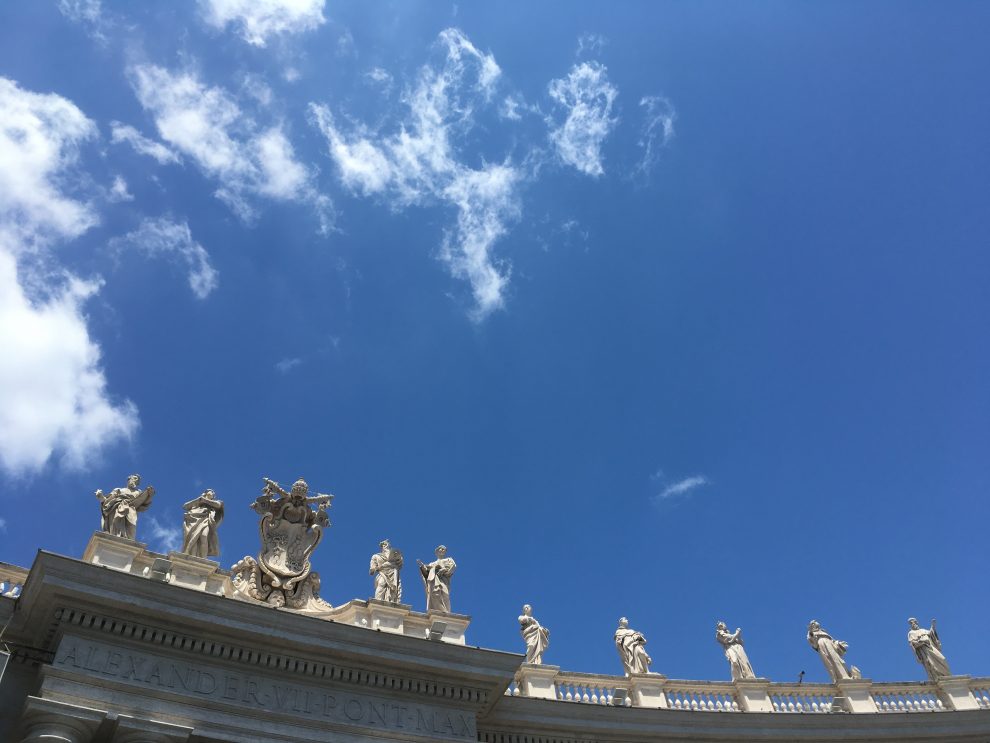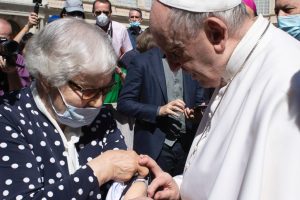Could you put that in layman’s terms, please? “With pleasure,” says Richard R. Gaillardetz, author of By What Authority? A Primer on Scripture, the Magisterium, and the Sense of the Faithful (Liturgical Press). While authority in the church may seem a bit academic, Gaillardetz has a way of making it practical.
He doesn’t dumb it down by any means, but simply frames the issue in a way that it will matter to the average Catholic, posing questions like: What if there is something in church law that just doesn’t sit right with you? Does that mean you’re not Catholic? Gaillardetz answers that and more—with a unique view into a church where faith, hope, and infallibility prevail.
A Texas native, Gaillardetz came up north for his graduate studies, earning his M.A. and Ph.D. from the University of Notre Dame. Currently an endowed chair in Catholic Studies at the University of Toledo, Gaillardetz and his wife, Diana, keep up with four boys at home.
His other books include A Daring Promise: A Spirituality of Christian Marriage (Crossroad Publishing, 2002) and Transforming Our Days: Spirituality, Community, and Liturgy in a Technological Age (Crossroad, 2000), as well as several academic texts on authority.
Authority seems to get a bad rap in the Catholic church. For many it comes with a negative connotation of oppression or suppression. Why is that?
There are examples of abusive authority in the history of the church that have contributed to that. But in fact, if you look at how our ancient tradition understands authority, it’s not that simple. We need to place it in a larger context.
While we often talk about objects, people, or offices having authority-as in “the pope has authority” or “the Bible has authority”-the truth of the matter is things don’t have authority, nor even do people in and of themselves. Authority resides in a particular relationship, so it requires the consent of at least two parties.
Authority is different from power. Power does not require the consent of all parties. A tyrant can have power over people without the people’s consent. But I would argue that a tyrant doesn’t have legitimate authority.
So when we talk about authority in the Catholic Church, we’re talking about a particular relationship or set of relationships within the church that binds the church together. Authority exists largely to hold the community together in unity.
How does a relationship gain authority?
For Christians authority ultimately resides in God. We believe that the Bible has authority, or that the pope, bishops, and even theologians do. But these people or things have that authority by virtue of their relationship with God.
In many cases abuse of authority happens when a person forgets that his or her authority is a shared authority, dependent on the authority of God.
Our Catholic teaching is actually quite clear that the pope exercises his authority, even his infallible authority, under very clear limits and that ultimately it’s not him but the Holy Spirit acting on behalf of the church.
What about those who are supposed to obey authority?
I would suggest that obedience is never to be understood as merely passive acquiescence. All Christians are called to respond to church authority in creative and responsible ways. Part of our relationship of respect to people in authority means letting them know about our concerns, always doing so with respect for the person and the office.
People think of authority in opposition to freedom. They think of freedom as unfettered ability to do whatever they want, to act without constraint, and that therefore authority, because it constrains freedom, constrains human creativity. But it’s not that way at all.
Human freedom is always circumscribed in some way-by the era and family one was born in, education, culture, and so on. One never has absolute freedom. So as American Catholics we have some cultural suspicions about the exercise of authority that make us very nervous about it.
Is this suspicion of authority specific to Americans?
Our country has a tradition of skepticism about the abuse of authority that’s written right into the Declaration of Independence and the Constitution. This nervousness is not entirely misplaced. I think of the current clergy sex-abuse crisis. Many people are outraged by the instances of sexual abuse, but they’re far more upset by the abuses in ecclesiastical leadership. Leadership has to demonstrate its own authenticity.
A strain of thought in modern Western philosophy says acting on the basis of someone else’s authority is irrational and that you should only act based on human reason. To act on the authority of others is seen as a kind of tyranny.
But in fact, we act based on the authority of others in many areas of our lives. One of my favorite examples is from the English Catholic theologian, Nicholas Lash, who pointed out that most everyone simply assents to the fact that Great Britain is an island, even though they’ve never empirically verified that. They haven’t followed the coast all the way around, but they assent to the truth of that statement based on the testimonies of others.
In the same way, when I go to a doctor and ask for a diagnosis for chest pains, I place my trust in the doctor that he or she is exercising authority appropriately. But somehow, when it comes to the church, we seem to be nervous about exercising that same kind of trust in church authorities, tradition, or scripture.
Why do we trust a doctor but not a bishop?
One reason is that we are probably more comfortable with the authority of expertise than with the authority of an office that has its roots of authority in grace. The authority of a bishop comes from the fact he holds an office that we believe is assisted by the Holy Spirit. Of course, it’s very hard to verify the assistance of the Holy Spirit.
The second reason is that there is a distinction between authority of office and authority of character. We recognize that sometimes we have to accept the authority of office even when individual officeholders disappoint us. If there’s a history of corrupt officeholders, ultimately even the authority of office gets undermined. That has certainly been the case in church history.
Then there are people in our lives who possess a great deal of authority for us even though they don’t hold any legal office at all. Their voices carry a lot of moral weight, the weight of character. One example is Mother Teresa.
Our present pope is an excellent example of someone who has both authority of office and character. People listen to him who don’t accept any Catholic teaching on papal authority. They listen to him because he has tremendous authority of character.
History tells us that figures who draw exclusively on the authority of office ultimately don’t make much of a difference in the church.
Do laypeople have any authority?
Yes. There are several kinds of authority in the church: the authority of the official church magisterium, the authority of theologians, and the authority of all the Christian faithful.
Laypeople exercise this third kind of authority, which is theirs by virtue of Baptism. All the baptized have what Vatican II called a “supernatural instinct for the faith,” the sensus fidei.
Now, individually no one is infallible in the exercise of that instinct. We can be mistaken, but it’s a real instinct. It comes from the practice of applying the gospel and church teaching in our daily lives that allows us to acquire a certain wisdom about living the Christian life today-a witness to what it means, not just in general to be a Christian, but what it means to be a Christian in 2005 in Toledo, Ohio.
But does that really hold any weight?
Vatican II said in the Dogmatic Constitution on Divine Revelation that tradition grows and develops not just through the teaching of the bishops. In fact, the first way it develops is through the faithful who contemplate the gospel, who penetrate it through reflection and study and apply it in their lives. Then they give that feedback to our bishops and theologians, and if they’re good bishops and good theologians, they listen to that witness.
In the 19th century the impetus that led Pius IX to define the Immaculate Conception didn’t come from the bishops but the devotion of the people. Before Pius IX defined this dogma he wrote a letter to all the bishops and asked, “What do the people believe?” When the bishops confirmed that this was indeed the faith of the people, then he defined it. Pius XII did the same thing on the bodily Assumption of Mary.
But doesn’t the idea of laypeople influencing doctrine make some people nervous?
You often hear that “the church is not a democracy.” I think if anybody knows anything about Catholicism, that is true not just descriptively, but prescriptively. I don’t think the church is supposed to be a democracy, if by “democracy” we mean a majority rule.
But, while the church is not a democracy, it has always possessed democratic elements, processes that try to discover the insight of larger bodies of people. The papacy is actually the longest continuously functioning democratic institution in Western civilization. We have elected popes since the 11th century. Voting has always played a role in the life of the church. We’ve used ballots-and here’s the crucial difference from a liberal democracy-as a way of discerning the Spirit. I’m not supposed to vote on my individual desire or preference, but based on my discernment of where the Spirit is leading us.
Many would say the church is moving farther away from this democratic style. Would you agree?
That’s a fair observation, and I think it may be a backlash to some of the collaborative methods used by the bishops in the last part of the 20th century. In the 1980s, the American bishops wrote two very well-known pastoral letters, one on war and peace and the other on the economy. In that process they had a committee who wrote drafts, then published and distributed them to get feedback. There were listening sessions held in individual dioceses, and they invited testimony from all sorts of experts.
The bishops were still responsible for promulgating the final document, but they dared to listen to the people and to experts, to be shaped by those influences before they exercised their own proper authority.
Later they tried to write a pastoral letter about women in the church in the same collaborative way, and it’s well known that the Vatican made it clear to the U.S. bishops that it did not want that kind of methodology to continue. Now the fact that it was dealing with women, a particularly explosive issue, probably heightened the sensitivities of the Vatican. But I think they were going to nix that methodology no matter what the topic was. The U.S. bishops have never done it since.
Does the Vatican or the pope consult others when making policy?
Yes, they do, often quite widely. And there’s no question papal encyclicals get vetted by various curial offices and certain other theologians and even some bishops before they’re published. But there are many who question who it is that gets to see it. Often it’s only the approved figures who are already known to be sympathetic with the approach articulated in the encyclical. Rarely do we have evidence of these things being distributed to theologians or church leaders known to be in opposition in order to get a critical response.
Can dogma change?
Yes, in a sense, but it’s complex. First of all there are two types of teaching: dogma and other forms of church teaching that are not dogmatic. The church holds that dogma faithfully mediates some truth regarding God’s saving offer. As such, we can be confident that they’re not erroneous.
Examples of dogma would be the Trinity, the eucharistic Real Presence, the Incarnation. But even these can be reformulated or improved upon, but not in such a way that what was previously formulated was wrong, but simply by trying ways to find better ways to communicate it.
Now when you’re talking about non-dogmatic teaching, I think there’s even more room for revision, and historically there have even been instances of reversal.
For example?
The classic example is slavery. I should be clear that the church never said slavery was a good thing, but it did teach that in some instances it could be tolerated as a manifestation of the brokenness of the human condition. Certainly the church does not teach that anymore.
How do you respond to people who say: Well, if the church can reverse one thing, why can’t it reverse other things?
Some people talk about cafeteria Catholicism where you’re free to say, “Oh, well, if it’s not been taught infallibly I’ll just blow it off.” No, I think you have an obligation as a faithful Catholic to give a presumption of truth. But that presumption is just that. It’s a presumption; it’s not absolute.
It’s very important to recognize that there is a hierarchy of truths among our dogmatic teachings. Vatican II taught that even among dogmas of the church, not all have the same relationship to the foundations of the Christian faith.
A good example is, you’ve got a dogmatic teaching about the saving work of Jesus Christ and a dogmatic teaching about the Immaculate Conception of Mary. The second teaching’s meaning depends on the first. You can’t understand the Immaculate Conception unless you first understand the saving work of Christ.
Then there’s a second category that’s somewhat controversial, called “definitive doctrine.” These teachings are not themselves divinely revealed but are in some way necessary to safeguard and faithfully expound divine revelation. A classic example is the canon of books we have in the Bible.
Beyond that you have “authoritative doctrine”-binding teachings of the church that Catholics must give a presumption of truth to. But since they’ve not been taught infallibly, there’s at least a remote possibility of error. An example of that would be the church’s condemnation of in vitro fertilization or the prohibition of artificial contraception. These are binding teachings. You’re not allowed just to blow them off.
Finally, the fourth circle really isn’t doctrine at all; it’s church law or discipline, things like the General Instruction of the Roman Missal. It’s binding here and now for the life of the church, but it could be revised tomorrow. We can have altar girls now; we couldn’t before.
But maybe a more pertinent example is celibacy for diocesan priests; that’s simply a matter of church law. If a Catholic has a disagreement with the church on this lower level, it is not as serious as denying a dogma.
What are the nonnegotiables?
Generally, divine revelation. And it seems to me we have to make a distinction: If a Catholic deliberately, obstinately, publicly renounces a dogmatic teaching of the church, we do not say they are outside the purview of God’s loving care and concern, but I think we have to say they have separated themselves from the Roman Catholic communion. But I’m not saying they cannot be saved or that God does not love them.
What’s the difference between public dissent and withholding internal assent?
Dissent generally involves a public and formal act of disagreement, whereas withholding assent is not necessarily public. Internal assent means we’re to give a “submission of intellect and will.”
That means doing three things concretely: First, you try to really understand the church’s teaching. Second, you do an examination of conscience and ask: “Why am I having a hard time with this teaching? Is it because I don’t see the will of God in it? Or is it because, if this teaching is true, I’d have to change my lifestyle?” And here’s what’s important: Nobody can answer that but me.
The third thing is that you make sure that your problem isn’t just with the idea of a church teaching office, that in principle you don’t recognize the authority of the church’s teaching office. If you’re a Catholic, that’s not a permissible position. If you’ve done those things and you still can’t agree, then you are withholding an internal assent.
Generally legitimate dissent comes into play when you’re talking about activists, theologians, or clerics who are more inclined to be called upon to make public statements. In principle I don’t have a problem holding church officials to a higher standard in this regard, since they represent the Catholic Church in a different way.
Where things get very difficult for me is when we hold church officials accountable, not only for their public views, but for what we might call the internal forum-views that they hold in the privacy of their heart but have not publicly voiced. I do not believe you can censure an official because they have privately struggled with a question if they’ve been willing to keep their struggles to themselves.
Who has the authority to decide who is a “good” Catholic?
I am not comfortable with the language of “good Catholic” or even “Catholic in good standing,” because, frankly, they say very little. To be a Catholic in good standing at some level only means that I am not objectively and publicly departing from the church’s discipline or rejecting the church’s doctrinal teaching.
It says very little about interior dispositions, holiness or lack thereof, or fidelity to the gospel. It’s also language that can mask real issues.
Obviously it is the responsibility of the magisterium to articulate Catholic teaching. I do not dispute that in any way. So my opinion, for example, as a theologian, cannot and should not be given the same weight as the official teaching of the church.
It’s not a question of where you stand on teaching as frequently as it is your attitude in approaching it. To use the birth control issue, I think there are a lot of Catholics who don’t withhold assent, they simply ignore it. I don’t think that’s legitimate.
Catholics are obliged to do their best to give the presumption of truth to such teachings, to try and assimilate them. But if in doing so, Catholics at the end of the day say: “I simply cannot internally assent to that,” I would argue they have genuinely done all the church has asked of them.
I will argue to my last breath that it is possible for a Catholic to be in good standing and not be able to give internal assent to every teaching and practice and discipline of the church.













Add comment